-
 Bitcoin
Bitcoin $82,099.5826
-1.34% -
 Ethereum
Ethereum $1,817.9545
-1.07% -
 Tether USDt
Tether USDt $0.9999
0.02% -
 XRP
XRP $2.0815
-3.96% -
 BNB
BNB $595.8647
-1.53% -
 Solana
Solana $124.0327
-0.92% -
 USDC
USDC $1.0000
0.01% -
 Dogecoin
Dogecoin $0.1634
-3.94% -
 Cardano
Cardano $0.6445
-4.65% -
 TRON
TRON $0.2336
1.34% -
 Toncoin
Toncoin $3.9381
2.61% -
 Chainlink
Chainlink $13.2201
-3.75% -
 UNUS SED LEO
UNUS SED LEO $9.0947
-5.84% -
 Stellar
Stellar $0.2646
-1.90% -
 Avalanche
Avalanche $18.6234
-3.91% -
 Shiba Inu
Shiba Inu $0.0...01214
-3.88% -
 Sui
Sui $2.2126
-6.78% -
 Hedera
Hedera $0.1604
-6.61% -
 Polkadot
Polkadot $4.0237
-1.97% -
 Litecoin
Litecoin $82.1655
-4.48% -
 MANTRA
MANTRA $6.2849
-1.13% -
 Bitcoin Cash
Bitcoin Cash $298.8203
-2.66% -
 Dai
Dai $1.0000
0.02% -
 Bitget Token
Bitget Token $4.4293
-4.57% -
 Ethena USDe
Ethena USDe $1.0000
0.01% -
 Pi
Pi $0.6976
-9.77% -
 Hyperliquid
Hyperliquid $12.5853
-0.74% -
 Monero
Monero $215.4717
-0.22% -
 Uniswap
Uniswap $5.8825
-1.85% -
 Aptos
Aptos $5.1958
-2.29%
How to export the public key of SafePal S1?
The SafePal S1 prioritizes security by not allowing direct public key export, but you can view wallet addresses and use blockchain explorers for transaction verification.
Mar 28, 2025 at 06:15 pm
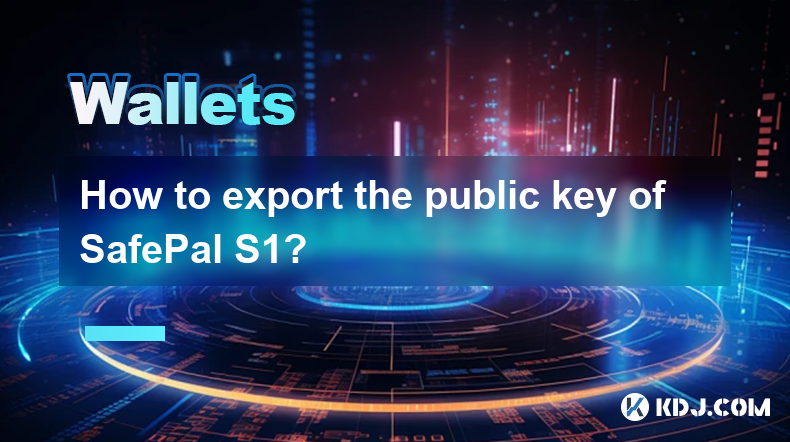
Understanding SafePal S1 and Public Keys
The SafePal S1 is a hardware wallet prioritizing security for your crypto assets. Unlike software wallets, its private keys remain largely offline, enhancing protection against hacking. However, you might need your public key for various reasons, such as verifying transactions or adding your wallet to decentralized applications (dApps). It's crucial to understand that exposing your private key compromises your security, while the public key is safe to share. This guide focuses solely on exporting the public key; never attempt to export your private key.
Accessing Your Public Key: The Limitations
Unfortunately, the SafePal S1 does not directly offer a function to export your public key in a readily accessible format. The wallet's design emphasizes security, prioritizing the concealment of sensitive information. This deliberate omission prevents accidental exposure of your public key, which, while not directly controlling your funds, can still be exploited in sophisticated attacks if combined with other information.
Workarounds and Indirect Methods
While a direct export is unavailable, there are indirect ways to obtain information derived from your public key. These methods don't provide the raw public key itself, but offer equivalent information for most use cases.
Viewing Addresses: The SafePal S1 allows you to easily view your wallet addresses. These addresses are derived from your public key and serve as your public-facing identifiers for receiving cryptocurrency. You can find these addresses within the wallet's interface for each specific cryptocurrency you hold. This is often sufficient for most interactions with dApps and exchanges.
Transaction Verification: Each transaction made from your SafePal S1 can be verified using blockchain explorers. These explorers use the transaction's hash, which indirectly relates to your public key. By inputting the transaction hash, you can confirm the transaction details, proving the ownership of the funds without directly revealing the public key.
Third-Party Tools (Use with Caution): Some third-party tools claim to extract information related to your public key from your SafePal S1. However, using such tools carries significant risk. It's crucial to thoroughly research and verify the legitimacy and security of any third-party software before using it with your hardware wallet. Malicious software could compromise your security.
Understanding the Implications of Public Key Usage
Remember, even though your public key is not your private key, it's still sensitive information. Avoid sharing it unnecessarily. Legitimate services should not require your public key directly; instead, they'll use your wallet address.
Security Risks: While not directly controlling your funds, a compromised public key can, in theory, be used in conjunction with other data to potentially compromise your security. Always be cautious about where you share any information related to your wallet.
Privacy Concerns: Your public key is linked to your transactions on the blockchain. While this is public information by the nature of blockchain technology, be mindful of the information you are revealing through your transactions.
Wallet Address vs. Public Key: Your wallet address is derived from your public key and is the identifier you use for receiving funds. It's safe to share your wallet address, but avoid sharing your raw public key unless absolutely necessary and only to trusted sources.
Alternative Approaches and Considerations
If you require your public key for specific applications, consider these alternatives:
Using a different wallet: Some software wallets allow direct export of the public key. If your use case demands this functionality, transferring your assets to a wallet that supports this feature might be a solution. However, this introduces the risks associated with software wallets.
Contacting SafePal Support: If you have a specific, legitimate need for your public key, you could contact SafePal support. They may be able to offer assistance or clarify if there are any alternative methods. However, they are unlikely to provide the raw public key directly due to security concerns.
Frequently Asked Questions
Q: Can I directly export my SafePal S1's private key?
A: No, the SafePal S1 is designed to prevent the direct export of your private key. Attempting to do so could damage your device or compromise your funds.
Q: Is it safe to share my public key?
A: While less risky than sharing your private key, sharing your public key is still not recommended unless absolutely necessary and to trusted sources. It's linked to your transactions and can potentially be exploited if combined with other information.
Q: What should I do if I suspect my SafePal S1 has been compromised?
A: Immediately secure your device and contact SafePal support. Change your seed phrase if possible and monitor your accounts for any unauthorized activity.
Q: Why doesn't SafePal S1 allow direct public key export?
A: SafePal prioritizes security. Direct export of the public key, while not directly controlling funds, could increase the risk of sophisticated attacks if combined with other compromised information. The indirect methods, such as using wallet addresses, provide sufficient functionality for most use cases while maintaining strong security.
Q: Are there any risks associated with using third-party tools to access my public key?
A: Yes, using unverified third-party tools carries significant risks. Malicious software could compromise your device and steal your private keys. It's strongly advised to avoid such tools unless you have thoroughly verified their legitimacy and security. Sticking to official SafePal channels and methods is always the safest approach.
Disclaimer:info@kdj.com
The information provided is not trading advice. kdj.com does not assume any responsibility for any investments made based on the information provided in this article. Cryptocurrencies are highly volatile and it is highly recommended that you invest with caution after thorough research!
If you believe that the content used on this website infringes your copyright, please contact us immediately (info@kdj.com) and we will delete it promptly.
- CZ Announces Plan to Donate 500 BNB Each to Myanmar and Thailand
- 2025-03-31 20:00:12
- Bitcoin (BTC -2.46%) has earned a place in almost every investor's portfolio.
- 2025-03-31 20:00:12
- Bitcoin (BTC) ETF Witnessed a Major Shift as Investors Pulled out $93 Million
- 2025-03-31 19:55:12
- Nigeria Accuses Binance of Facilitating Terrorism and Kidnapping Financing
- 2025-03-31 19:55:12
- A Sentiment Shift Appears Underway Within the XRP Community
- 2025-03-31 19:50:12
- A Quarter of S&P 500 Firms Could Be Holding Bitcoin on Their Balance Sheets by 2030: Report
- 2025-03-31 19:50:12
Related knowledge

How to easily generate a Bitcoin payment address
Mar 29,2025 at 10:49am
Generating a Bitcoin payment address might seem daunting, but it's actually quite straightforward. This process is crucial for receiving Bitcoin, as each transaction requires a unique address. Understanding how this works is fundamental to using Bitcoin effectively. This guide will walk you through the simple steps, regardless of your technical experti...
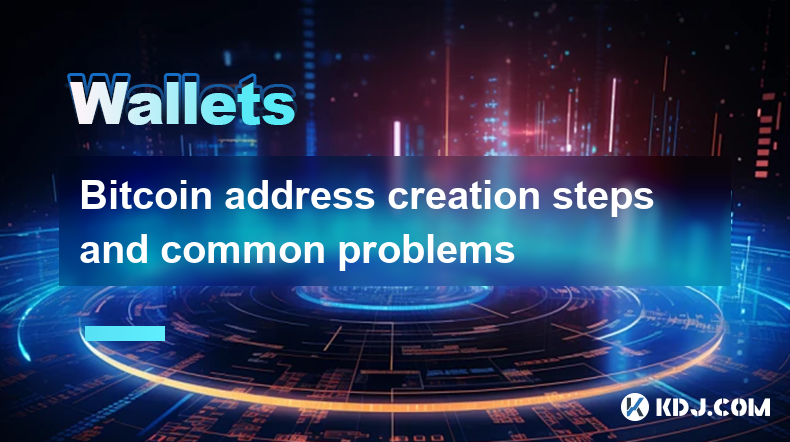
Bitcoin address creation steps and common problems
Mar 30,2025 at 06:07am
Understanding Bitcoin AddressesA Bitcoin address is a unique identifier, similar to a bank account number, used to receive Bitcoin. It's a string of alphanumeric characters generated from a public key, derived from your private key. Understanding the distinction between public and private keys is crucial for Bitcoin security. Your private key should be...
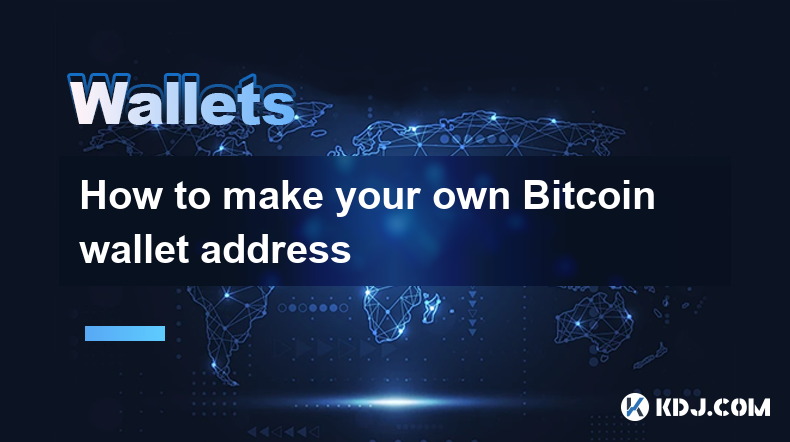
How to make your own Bitcoin wallet address
Mar 29,2025 at 08:42pm
Creating your own Bitcoin wallet address is crucial for securing and managing your Bitcoin holdings. It allows you to independently receive and send Bitcoin without relying on third-party services. This process involves understanding the different types of wallets and choosing the one that best suits your needs and technical expertise. Incorrectly gene...
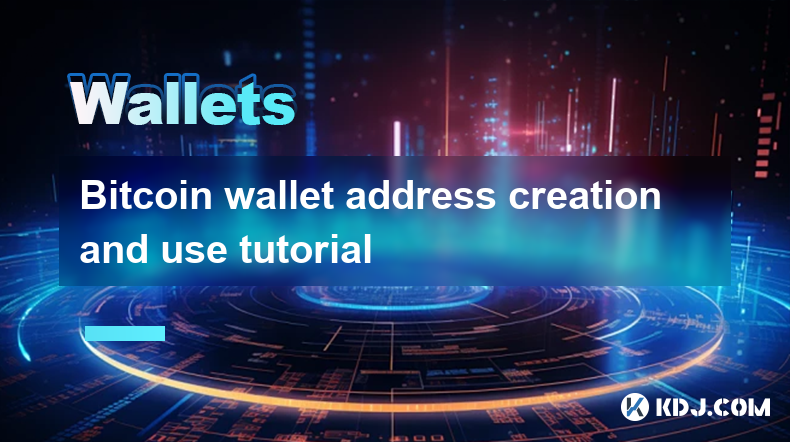
Bitcoin wallet address creation and use tutorial
Mar 29,2025 at 10:14pm
Understanding Bitcoin Wallet AddressesA Bitcoin wallet doesn't store Bitcoin in the way a traditional bank account does. Instead, it stores private keys, which are cryptographic secrets allowing you to access and spend your Bitcoin. Your Bitcoin address, on the other hand, is a public identifier, like an email address, that others can use to send you B...

Bitcoin address generation and secure storage guide
Mar 30,2025 at 08:07am
Understanding Bitcoin AddressesA Bitcoin address is essentially your public key, a string of alphanumeric characters used to receive Bitcoin. It's analogous to your bank account number. Unlike your private key, which is crucial for spending your Bitcoin, your address can be shared publicly without compromising your funds. Generating a new address is sim...
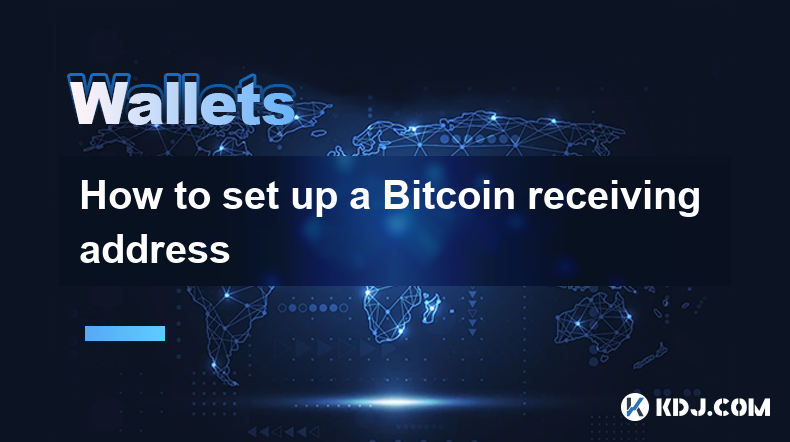
How to set up a Bitcoin receiving address
Mar 30,2025 at 06:14pm
Understanding Bitcoin Receiving AddressesA Bitcoin receiving address is essentially your unique identifier on the Bitcoin network. It's a string of alphanumeric characters that allows others to send Bitcoin to you. Think of it like your bank account number, but specifically for Bitcoin. You need a receiving address to receive Bitcoin. Crucially, you ca...

How to easily generate a Bitcoin payment address
Mar 29,2025 at 10:49am
Generating a Bitcoin payment address might seem daunting, but it's actually quite straightforward. This process is crucial for receiving Bitcoin, as each transaction requires a unique address. Understanding how this works is fundamental to using Bitcoin effectively. This guide will walk you through the simple steps, regardless of your technical experti...

Bitcoin address creation steps and common problems
Mar 30,2025 at 06:07am
Understanding Bitcoin AddressesA Bitcoin address is a unique identifier, similar to a bank account number, used to receive Bitcoin. It's a string of alphanumeric characters generated from a public key, derived from your private key. Understanding the distinction between public and private keys is crucial for Bitcoin security. Your private key should be...

How to make your own Bitcoin wallet address
Mar 29,2025 at 08:42pm
Creating your own Bitcoin wallet address is crucial for securing and managing your Bitcoin holdings. It allows you to independently receive and send Bitcoin without relying on third-party services. This process involves understanding the different types of wallets and choosing the one that best suits your needs and technical expertise. Incorrectly gene...

Bitcoin wallet address creation and use tutorial
Mar 29,2025 at 10:14pm
Understanding Bitcoin Wallet AddressesA Bitcoin wallet doesn't store Bitcoin in the way a traditional bank account does. Instead, it stores private keys, which are cryptographic secrets allowing you to access and spend your Bitcoin. Your Bitcoin address, on the other hand, is a public identifier, like an email address, that others can use to send you B...

Bitcoin address generation and secure storage guide
Mar 30,2025 at 08:07am
Understanding Bitcoin AddressesA Bitcoin address is essentially your public key, a string of alphanumeric characters used to receive Bitcoin. It's analogous to your bank account number. Unlike your private key, which is crucial for spending your Bitcoin, your address can be shared publicly without compromising your funds. Generating a new address is sim...

How to set up a Bitcoin receiving address
Mar 30,2025 at 06:14pm
Understanding Bitcoin Receiving AddressesA Bitcoin receiving address is essentially your unique identifier on the Bitcoin network. It's a string of alphanumeric characters that allows others to send Bitcoin to you. Think of it like your bank account number, but specifically for Bitcoin. You need a receiving address to receive Bitcoin. Crucially, you ca...
See all articles






















































































